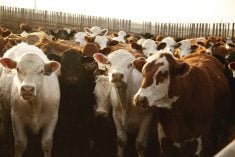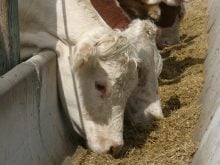The Canadian Cattlemen’s Association is downplaying news today that South Korea is restricting beef imports following the case of atypical BSE being found in Alberta last week.
CCA executive vice-president Dennis Laycraft said the move stems from Canada’s particular export agreement with South Korea requiring verification of information of BSE cases by Seoul.
“We would expect this suspension to be lifted very quickly,” said Laycraft. “It shouldn’t affect any of the product that’s been processed, going to be processed or shipped.”
Read Also

Beef cattle more prone to trace mineral deficiencies
The trace mineral status of our cows and calves is a significant challenge for western Canadian producers and veterinarians.
Laycraft highlighted the atypical nature of atypical BSE, which occurs spontaneously, though rarely, anywhere in the world.
The classic variant of BSE was caused by contaminated feed with Canada imposing strict regulations governing disposal of parts of carcasses known to transmit the prion disease following its 2003 discovery in Alberta.
“Effectively, once you determine it’s atypical, your investigation is closed because you know it wasn’t the result of any exposure to the animal and certainly exposure to any cohorts,” said Laycraft.
South Korea’s Ministry of Agriculture, Food and Rural Affairs has asked the Canadian Food Inspection Agency to provide further information regarding the latest BSE case, the first of any kind in Canada since 2015.
CFIA officials have provided that information, according to the CCA, and is addressing any clarification required.
Laycraft said the particulars of the Canada-South Korea trade agreement require suspension of the beef imports until details of any case of BSE are shared with Seoul.
“We have a bit of a unique veterinarian certificate with South Korea, which I think is leading to this,” said Laycraft.
“But we know all the information that they are going to require will be, or should be, available to them by the end of (Tuesday).”
He said that’s an approach South Korea has which isn’t usually found in other beef trade agreements, especially when it comes to atypical BSE cases.
“We need to modernize the veterinarian certificate with a few countries, South Korea being one of them, now that we are in a negligible risk status,” said Laycraft.
The World Animal Health Organization (OIE) certified Canada as having negligible risk of BSE earlier this year.
Laycraft said Canada followed all the regulations from the OIE regarding reporting of BSE, including that it was done within 24 hours of its discovery.
Alberta’s atypical BSE case was the first reported in North America since an eight-year-old beef cow in Florida was found with it in 2018.
Alberta’s last BSE case was reported in 2015.
alex.mccuaig@producer.com















